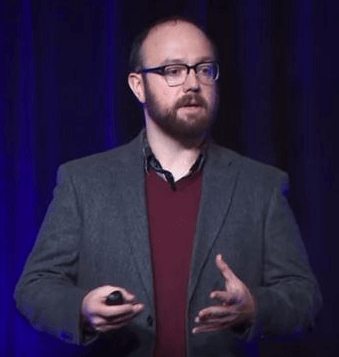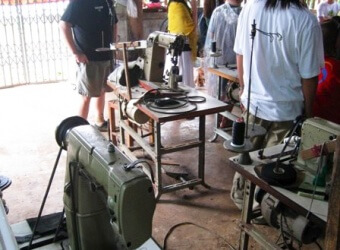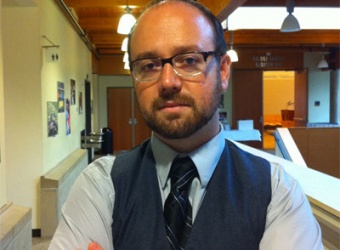
Some people think that human trafficking is only something that happens outside of our own communities. But they’re wrong…here’s Robert Beiser, Executive Director of Seattle Against Slavery, to tell you why this problem is our problem.
Human Trafficking is Our Problem
(a guest post by Robert Beiser)
The word “trafficking” might not seem all that horrible. But in the case of human trafficking, it represents racism, sexism, globalization, violence and environmental destruction, all in one combined form. And although many may only have heard the term in passing, it’s been around in many forms for a long time. It’s not a horrible new phenomenon. It doesn’t just happen in one far-away part of the globe. Human trafficking happens in almost every country in the world – even in the United States. And every day, it’s my job – at Seattle-based Seattle Against Slavery – to help end it.
Human trafficking is the use of force (physical violence), fraud (lying or tricking), or coercion (pressure, shaming, threats, etc.) to compel someone to work in any industry. Some people call this “modern slavery,” and many survivors around the world will say “slaves” is just what they were. Trafficking victims are in industries like manufacturing, agriculture, domestic work, prostitution, mining and even the drug trade. They fear the violence and harm that will come if they try to leave, so many are trapped in dangerous situations for years, working long hours for low or no pay under the control of their trafficker.
Before I even knew what trafficking was, I first encountered it in 2010 while leading a group of Jewish students learning about economic development in rural Thailand (video here). Hmong, Karen, and other ethnic groups from Burma were being rounded up by the Burmese government and forced to work in factories along the Thai/Burmese border. The traffickers and soldiers also felt entitled to sex, so the area was full of brothels with girls as young as 11 years old being bought for sex multiple times a day. I couldn’t wrap my head around what life would be like knowing your choices were either a) submit to the traffickers, or b) maybe die trying to escape. When one of the girls asked me, “do you have places like this where you come from?” I realized the answer was” yes,” and that meant there was work for me to do in my own community. We know there are pimps in our towns. We know immigrant laborers are threatened and abused. Like most of us, I had turned a blind eye to the exploitation and forced prostitution I knew was happening in my city. But when this girl asked me that question, I felt like I couldn’t be heartbroken about trafficking on the other side of the world without feeling a responsibility to do something to stop it where I lived.

While human trafficking is a relatively new term, this practice of exploiting the vulnerable for profit has a solid history around the world and here in the United States. Threatening violence or deportation in order to get immigrant laborers to work for free? That happens, and now it’s human trafficking. A pimp beating up a woman in prostitution or threatening to kill her if she doesn’t have sex with strangers and bring back the money? That’s trafficking, too. Housekeepers and nannies brought into the country by a “recruiting service” for seemingly legal jobs, only to have their passports taken and their families threatened if they don’t keep quiet and work to pay off fraudulent debts? That happens all over the country, and now is defined as human trafficking, as well.
For decades these situations were blamed on the victims themselves, as if the traffickers had no responsibility for their crimes, but when the Trafficking Victims Protection Act (TVPA) passed in 2000, human trafficking became a Federal offense. That meant an increase in Federal resources for survivors of trafficking and new tools for local law enforcement to go after traffickers. Since then, it seems like not a week goes by without news of a trafficking bust somewhere in the United States. Services for survivors have been slower to develop, but networks of organizations that provide help for those escaping to freedom are also developing.
Much of the focus in the U.S. has been on sex trafficking, especially of youth, but this represents only a small slice of the violence that occurs. Victims many times fall along lines for other vulnerabilities, with people of color, immigrants, LGBTQ people, the poor, women, and children bearing the brunt of the crime. Traffickers come from various groups, as well, and we have seen cases of men and women, rich and poor, young and old all exploiting others for a financial gain. Men who buy sex from victims of sex trafficking are finally being held accountable, too, and many see this approach of reducing local demand by targeting the buyers as a promising development in preventing future harm.
This sounds like a rather bleak picture, but every day I hear stories of survivors finding ways to escape their abuse and connect with support in brave and incredible ways. Across the country and around the world, survivors are forming groups and leading organizations that advocate for increased services, better labor standards, and criminal charges for those who would hurt others for personal benefit.
Wherever you are reading this right now, there is likely an organization nearby supporting survivors or mobilizing your community to fight human trafficking, and I urge you to find them and support them with your time or money. Advocate. Volunteer. Educate. Fundraise. This is an issue that will take coordination and collaboration across many sectors of society to fight and ultimately eliminate, including churches and synagogues, businesses and schools, governments and nonprofits. I still think about that girl in Thailand and what I can do to have a different answer for her and for the millions around the world being abused and exploited. I believe if we’re all working to end human trafficking together, it’s a fight that can be won.
 Robert Beiser is the Executive Director of Seattle Against Slavery (SAS). After several years at Microsoft, he left the tech world to work in the nonprofit sector as a social justice advocate. Robert holds a Master’s Degree in Public Affairs from University of Washington, travels the country speaking on technology and human trafficking, and is chair of the Public Awareness Subcommittee of the Washington Statewide Task Force on Human Trafficking. For more information on his work, visit www.seattleagainstslavery.org.
Robert Beiser is the Executive Director of Seattle Against Slavery (SAS). After several years at Microsoft, he left the tech world to work in the nonprofit sector as a social justice advocate. Robert holds a Master’s Degree in Public Affairs from University of Washington, travels the country speaking on technology and human trafficking, and is chair of the Public Awareness Subcommittee of the Washington Statewide Task Force on Human Trafficking. For more information on his work, visit www.seattleagainstslavery.org.


Grok Nation Comment Policy
We welcome thoughtful, grokky comments—keep your negativity and spam to yourself. Please read our Comment Policy before commenting.